The Noun Clauses(名词性从句)(福建省泉州市晋江市)
文档属性
| 名称 | The Noun Clauses(名词性从句)(福建省泉州市晋江市) | 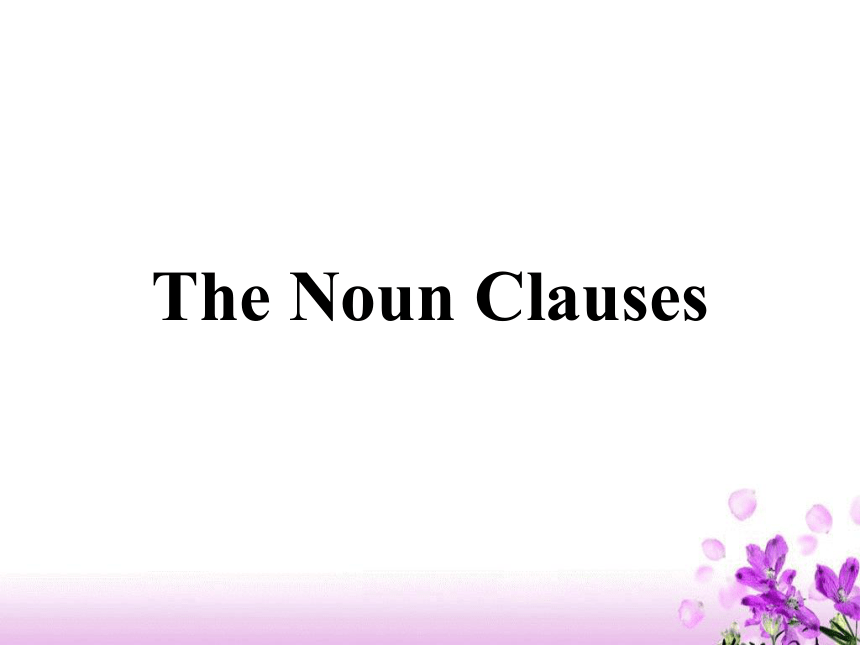 | |
| 格式 | rar | ||
| 文件大小 | 63.5KB | ||
| 资源类型 | 教案 | ||
| 版本资源 | 北师大版 | ||
| 科目 | 英语 | ||
| 更新时间 | 2008-04-22 09:07:00 | ||
图片预览

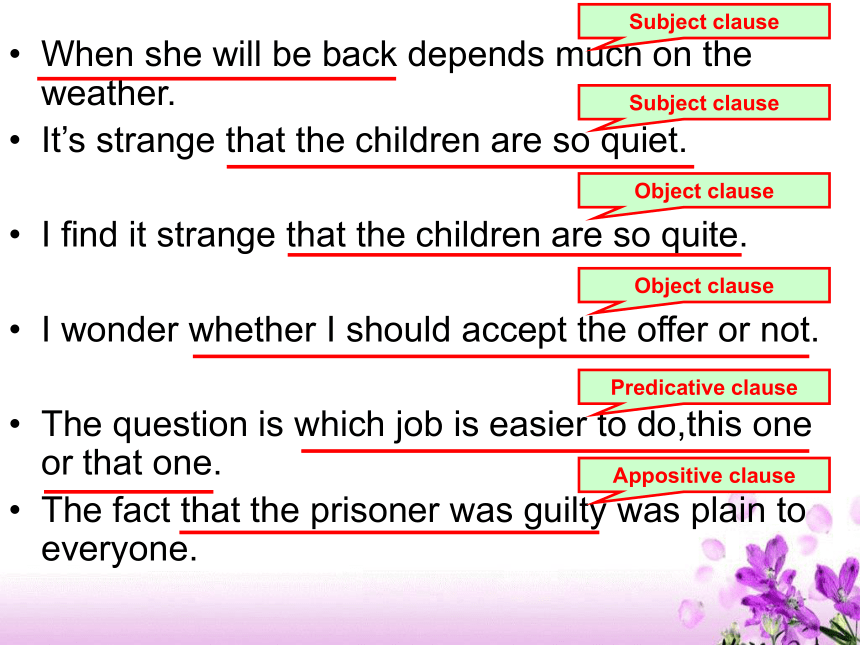
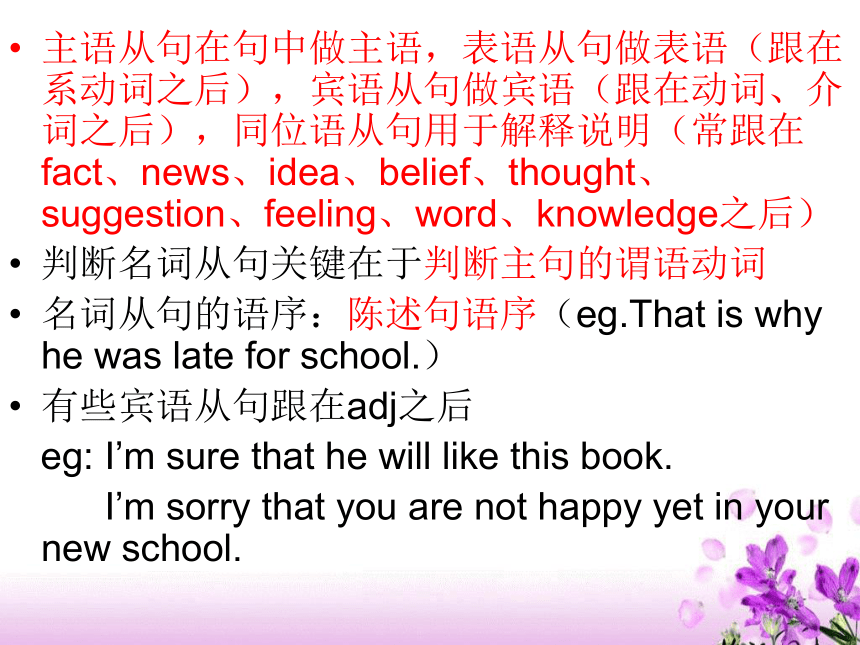
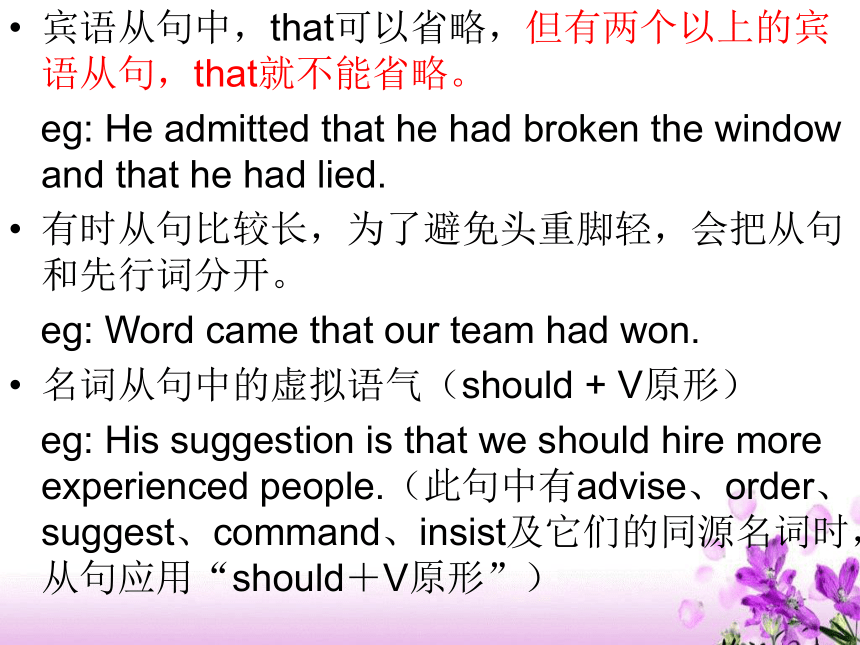
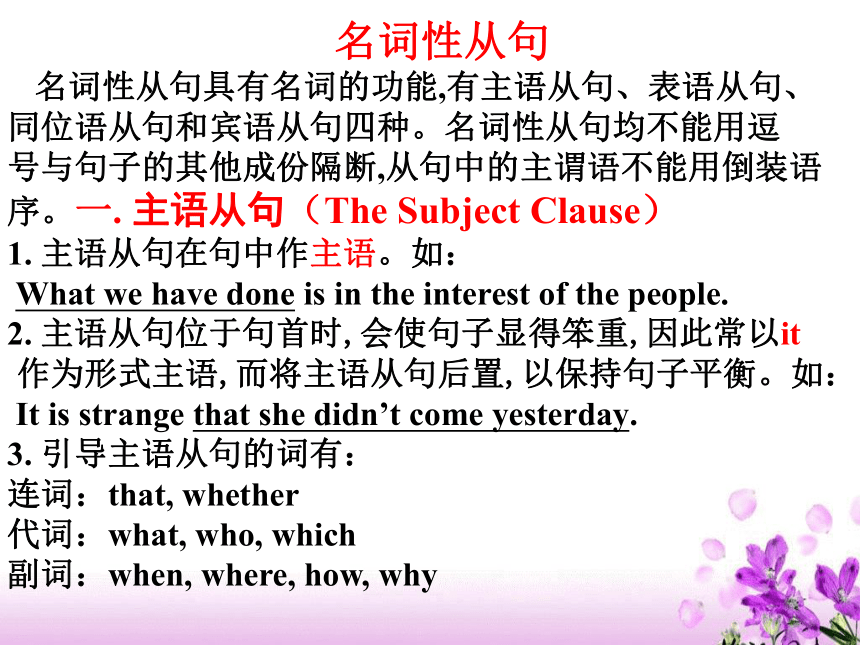
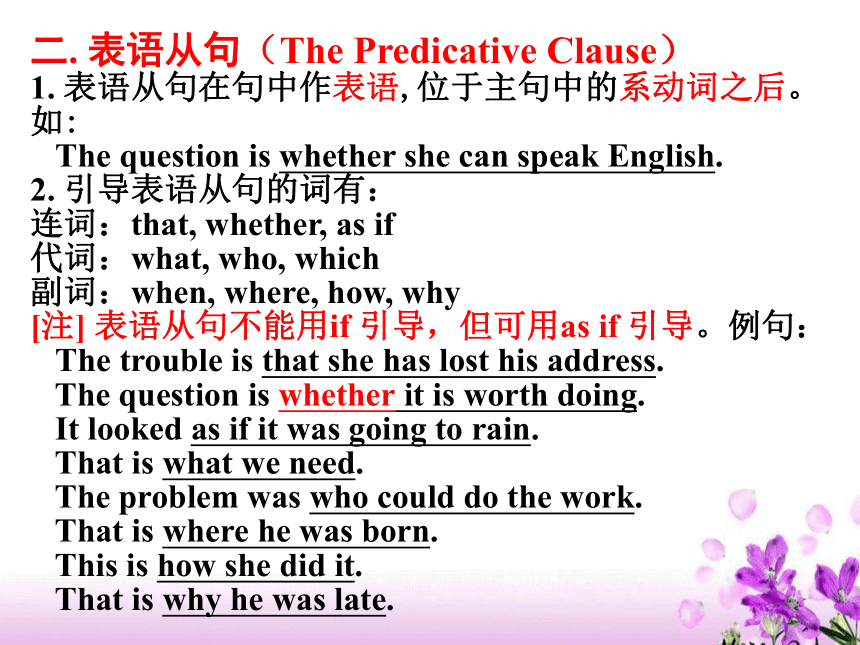
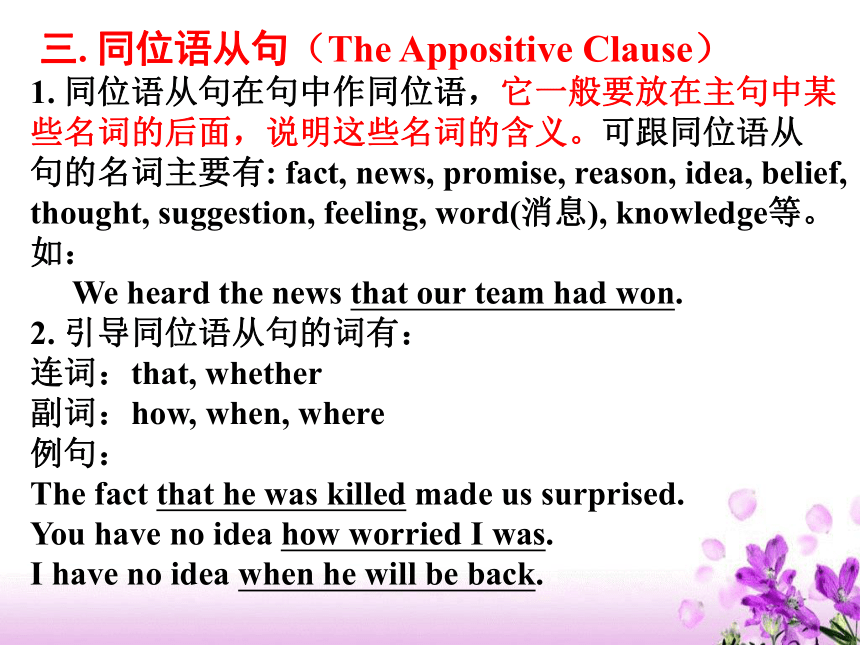
文档简介
课件17张PPT。The Noun ClausesWhen she will be back depends much on the weather.
It’s strange that the children are so quiet.
I find it strange that the children are so quite.
I wonder whether I should accept the offer or not.
The question is which job is easier to do,this one or that one.
The fact that the prisoner was guilty was plain to everyone.Subject clauseSubject clauseObject clauseObject clausePredicative clauseAppositive clause主语从句在句中做主语,表语从句做表语(跟在系动词之后),宾语从句做宾语(跟在动词、介词之后),同位语从句用于解释说明(常跟在fact、news、idea、belief、thought、suggestion、feeling、word、knowledge之后)
判断名词从句关键在于判断主句的谓语动词
名词从句的语序:陈述句语序(eg.That is why he was late for school.)
有些宾语从句跟在adj之后
eg: I’m sure that he will like this book.
I’m sorry that you are not happy yet in your new school.宾语从句中,that可以省略,但有两个以上的宾语从句,that就不能省略。
eg: He admitted that he had broken the window and that he had lied.
有时从句比较长,为了避免头重脚轻,会把从句和先行词分开。
eg: Word came that our team had won.
名词从句中的虚拟语气(should + V原形)
eg: His suggestion is that we should hire more experienced people.(此句中有advise、order、 suggest、command、insist及它们的同源名词时,从句应用“should+V原形”)名词性从句
名词性从句具有名词的功能,有主语从句、表语从句、 同位语从句和宾语从句四种。名词性从句均不能用逗 号与句子的其他成份隔断,从句中的主谓语不能用倒装语序。一. 主语从句(The Subject Clause) 1. 主语从句在句中作主语。如: What we have done is in the interest of the people. 2. 主语从句位于句首时,会使句子显得笨重,因此常以it 作为形式主语,而将主语从句后置,以保持句子平衡。如: It is strange that she didn’t come yesterday. 3. 引导主语从句的词有: 连词:that, whether 代词:what, who, which 副词:when, where, how, why二. 表语从句(The Predicative Clause) 1. 表语从句在句中作表语,位于主句中的系动词之后。如: The question is whether she can speak English. 2. 引导表语从句的词有: 连词:that, whether, as if 代词:what, who, which 副词:when, where, how, why [注] 表语从句不能用if 引导,但可用as if 引导。例句: The trouble is that she has lost his address. The question is whether it is worth doing. It looked as if it was going to rain. That is what we need. The problem was who could do the work. That is where he was born. This is how she did it. That is why he was late. 三. 同位语从句(The Appositive Clause) 1. 同位语从句在句中作同位语,它一般要放在主句中某些名词的后面,说明这些名词的含义。可跟同位语从 句的名词主要有: fact, news, promise, reason, idea, belief, thought, suggestion, feeling, word(消息), knowledge等。如: We heard the news that our team had won. 2. 引导同位语从句的词有: 连词:that, whether 副词:how, when, where 例句: The fact that he was killed made us surprised. You have no idea how worried I was. I have no idea when he will be back.
四. 宾语从句(The Object Clause) 1. 宾语从句在句中作及物动词或介词的宾语。如: I wonder who he is. He is sorry for what he has done. 2. 引导宾语从句的词有: 连词:that, whether, if 代词:who, whose, what, which 副词:when, where, how, why 例句: I think(that) he’ll be all right in a few days. I wonder whether(if) he can speak German or not. Do you know who(whom) they are waiting for? He asked whose book it was. Pay attention to what the teacher said. He can’t tell which method they will use for the experiment. Please tell me when you can finish the work. [注]:在口语及非正式文体中,宾语从句的引导词that常省略。3. 在使用宾语从句时应注意时态呼应。 1) 主句谓语动词是现在时或将来时,从句谓语动词可以用任何所需要的时态。 如:He says his father is/was a teacher. I’m sure that you’ll succeed. 2) 主句谓语动词是过去时态,从句谓语动词一般须用过去时。如: I thought he studied hard.(一般过去) He said he was watching TV.(过去进行) They didn’t know when they would go to Beijing. (过去将来) She said she had finished the work.(过去完成) [注]:从句如果与某一具体的过去时间状语连用,尽管其谓语动作发生在主句谓语动作之前,仍用一般过去时。如: She told me that her father died in 1991. 从句所说明的是一般真理或客观事实,即使主句用过去时,从句仍用一般现在时。 The teacher told the students that the computer is a wonderful machine. (一般现在)五.不能省略that 的宾语从句 1.句中的动词后接两个或两个以上的that从句作宾语时,第一个that可省,但后面的that 不可省。? He said (that) he couldn’t tell you right away and that you wouldn’t understand. 2.当主句的谓语动词与that宾语从句之间有插入语时,that一般不可省。 Just then I noticed, for the first time, that our master was wearing his fine green coat and his black silk cap.??? 3.当that从句是双宾语中的直接宾语时,that不可省? I must never tell anyone that I could not see the cloth.??? 4.当that宾语从句前有it作形式宾语时,that 不可省? We think it important that we study hard.六六. 分清几组易混的词whatthat例句:
What he said is true.
That he was chosen made us very excited.
He is not what he used to be.
The trouble is that she has lost his address.
I know what you need.
I think(that) he’ll be all right in a few days. 1.what 与that:what做句子成分,that不作句子成分2.whether与if :
whether···or,prep+whether例句:
Whether he will go or not is not clear. (主语从句)
It is not clear whether (if ) he will go.(主语从句)
The question is whether the TV play is worth watching. (表语从句)
The news whether our team has won the match is unknown.(同位语从句)
I’m interested in whether he‘ll come or not. (介词宾语从句)
I want to know whether (if) you have received my invitation.(宾语从句)3.who 与whoever
whoever含义为anyone who 可以引导名词性从句,而who虽也可以引导名词性从句,但它常只保存本身疑问的含义,即“谁”。如: Who will give us a talk is unknown.
Whoever breaks the law should be punished.
Who will come to our school is a question.
Whoever comes to our school will be welcome. 巩固练习 1.The question is ____? the film is worth seeing.
A.if? B.what C.whether D.how
2.One of the men held the view? ____ the book said was right.
A.that what? B.what that C.that? D.whether
3.They received orders ____? the work be done at once.
A.which????? B.when C./ D.that
4.Dr. Black comes from either Oxford or Cambridge, I can't remember?____.
A.where B.there C.which D.that
5.Energy is? ____ makes things work.
A.what? ? B.everything C.something? D.anything 6.The reason? ____ I have to go is ____ my mother is ill in bed.
A. why ; why? B. why ; because C. why ; that? D. that ; because
7.He doesn't think the question of ____ they are men or women is important.
A. whether? ? B. if????????? ? C. which? D. why
8.He often thinks of? ____ he can do more for his country.
A. what????? B. how????????? C. that??? D. which
9.It was ordered that all the soldiers ____ to the front.
A. should send? B. must be sent C. should be sent D. must go
10.Air is to us? ____ water is to fish.
A. is that????? B. what???????? C. which D. that11. It’s only by living in a country _____ one can find out ______ a country and its people are really like.
What; that B. that; which
C. that; what D. that; that
12. These photos will show you ______.
what does our village like
B. what our village looks like
C. how dose our village look like
D. how our village looks like13. ___ we can’t get seems better ___ we have.
A. what; what B. that; which
C. that; what D. that; that
14. The cause __ a man suffers from cancer is not yet known.
that B. why C. because D. which
15. ____ we’ll go camping tomorrow depends on the weather.
A.If B. Whether C. That D. Where
It’s strange that the children are so quiet.
I find it strange that the children are so quite.
I wonder whether I should accept the offer or not.
The question is which job is easier to do,this one or that one.
The fact that the prisoner was guilty was plain to everyone.Subject clauseSubject clauseObject clauseObject clausePredicative clauseAppositive clause主语从句在句中做主语,表语从句做表语(跟在系动词之后),宾语从句做宾语(跟在动词、介词之后),同位语从句用于解释说明(常跟在fact、news、idea、belief、thought、suggestion、feeling、word、knowledge之后)
判断名词从句关键在于判断主句的谓语动词
名词从句的语序:陈述句语序(eg.That is why he was late for school.)
有些宾语从句跟在adj之后
eg: I’m sure that he will like this book.
I’m sorry that you are not happy yet in your new school.宾语从句中,that可以省略,但有两个以上的宾语从句,that就不能省略。
eg: He admitted that he had broken the window and that he had lied.
有时从句比较长,为了避免头重脚轻,会把从句和先行词分开。
eg: Word came that our team had won.
名词从句中的虚拟语气(should + V原形)
eg: His suggestion is that we should hire more experienced people.(此句中有advise、order、 suggest、command、insist及它们的同源名词时,从句应用“should+V原形”)名词性从句
名词性从句具有名词的功能,有主语从句、表语从句、 同位语从句和宾语从句四种。名词性从句均不能用逗 号与句子的其他成份隔断,从句中的主谓语不能用倒装语序。一. 主语从句(The Subject Clause) 1. 主语从句在句中作主语。如: What we have done is in the interest of the people. 2. 主语从句位于句首时,会使句子显得笨重,因此常以it 作为形式主语,而将主语从句后置,以保持句子平衡。如: It is strange that she didn’t come yesterday. 3. 引导主语从句的词有: 连词:that, whether 代词:what, who, which 副词:when, where, how, why二. 表语从句(The Predicative Clause) 1. 表语从句在句中作表语,位于主句中的系动词之后。如: The question is whether she can speak English. 2. 引导表语从句的词有: 连词:that, whether, as if 代词:what, who, which 副词:when, where, how, why [注] 表语从句不能用if 引导,但可用as if 引导。例句: The trouble is that she has lost his address. The question is whether it is worth doing. It looked as if it was going to rain. That is what we need. The problem was who could do the work. That is where he was born. This is how she did it. That is why he was late. 三. 同位语从句(The Appositive Clause) 1. 同位语从句在句中作同位语,它一般要放在主句中某些名词的后面,说明这些名词的含义。可跟同位语从 句的名词主要有: fact, news, promise, reason, idea, belief, thought, suggestion, feeling, word(消息), knowledge等。如: We heard the news that our team had won. 2. 引导同位语从句的词有: 连词:that, whether 副词:how, when, where 例句: The fact that he was killed made us surprised. You have no idea how worried I was. I have no idea when he will be back.
四. 宾语从句(The Object Clause) 1. 宾语从句在句中作及物动词或介词的宾语。如: I wonder who he is. He is sorry for what he has done. 2. 引导宾语从句的词有: 连词:that, whether, if 代词:who, whose, what, which 副词:when, where, how, why 例句: I think(that) he’ll be all right in a few days. I wonder whether(if) he can speak German or not. Do you know who(whom) they are waiting for? He asked whose book it was. Pay attention to what the teacher said. He can’t tell which method they will use for the experiment. Please tell me when you can finish the work. [注]:在口语及非正式文体中,宾语从句的引导词that常省略。3. 在使用宾语从句时应注意时态呼应。 1) 主句谓语动词是现在时或将来时,从句谓语动词可以用任何所需要的时态。 如:He says his father is/was a teacher. I’m sure that you’ll succeed. 2) 主句谓语动词是过去时态,从句谓语动词一般须用过去时。如: I thought he studied hard.(一般过去) He said he was watching TV.(过去进行) They didn’t know when they would go to Beijing. (过去将来) She said she had finished the work.(过去完成) [注]:从句如果与某一具体的过去时间状语连用,尽管其谓语动作发生在主句谓语动作之前,仍用一般过去时。如: She told me that her father died in 1991. 从句所说明的是一般真理或客观事实,即使主句用过去时,从句仍用一般现在时。 The teacher told the students that the computer is a wonderful machine. (一般现在)五.不能省略that 的宾语从句 1.句中的动词后接两个或两个以上的that从句作宾语时,第一个that可省,但后面的that 不可省。? He said (that) he couldn’t tell you right away and that you wouldn’t understand. 2.当主句的谓语动词与that宾语从句之间有插入语时,that一般不可省。 Just then I noticed, for the first time, that our master was wearing his fine green coat and his black silk cap.??? 3.当that从句是双宾语中的直接宾语时,that不可省? I must never tell anyone that I could not see the cloth.??? 4.当that宾语从句前有it作形式宾语时,that 不可省? We think it important that we study hard.六六. 分清几组易混的词whatthat例句:
What he said is true.
That he was chosen made us very excited.
He is not what he used to be.
The trouble is that she has lost his address.
I know what you need.
I think(that) he’ll be all right in a few days. 1.what 与that:what做句子成分,that不作句子成分2.whether与if :
whether···or,prep+whether例句:
Whether he will go or not is not clear. (主语从句)
It is not clear whether (if ) he will go.(主语从句)
The question is whether the TV play is worth watching. (表语从句)
The news whether our team has won the match is unknown.(同位语从句)
I’m interested in whether he‘ll come or not. (介词宾语从句)
I want to know whether (if) you have received my invitation.(宾语从句)3.who 与whoever
whoever含义为anyone who 可以引导名词性从句,而who虽也可以引导名词性从句,但它常只保存本身疑问的含义,即“谁”。如: Who will give us a talk is unknown.
Whoever breaks the law should be punished.
Who will come to our school is a question.
Whoever comes to our school will be welcome. 巩固练习 1.The question is ____? the film is worth seeing.
A.if? B.what C.whether D.how
2.One of the men held the view? ____ the book said was right.
A.that what? B.what that C.that? D.whether
3.They received orders ____? the work be done at once.
A.which????? B.when C./ D.that
4.Dr. Black comes from either Oxford or Cambridge, I can't remember?____.
A.where B.there C.which D.that
5.Energy is? ____ makes things work.
A.what? ? B.everything C.something? D.anything 6.The reason? ____ I have to go is ____ my mother is ill in bed.
A. why ; why? B. why ; because C. why ; that? D. that ; because
7.He doesn't think the question of ____ they are men or women is important.
A. whether? ? B. if????????? ? C. which? D. why
8.He often thinks of? ____ he can do more for his country.
A. what????? B. how????????? C. that??? D. which
9.It was ordered that all the soldiers ____ to the front.
A. should send? B. must be sent C. should be sent D. must go
10.Air is to us? ____ water is to fish.
A. is that????? B. what???????? C. which D. that11. It’s only by living in a country _____ one can find out ______ a country and its people are really like.
What; that B. that; which
C. that; what D. that; that
12. These photos will show you ______.
what does our village like
B. what our village looks like
C. how dose our village look like
D. how our village looks like13. ___ we can’t get seems better ___ we have.
A. what; what B. that; which
C. that; what D. that; that
14. The cause __ a man suffers from cancer is not yet known.
that B. why C. because D. which
15. ____ we’ll go camping tomorrow depends on the weather.
A.If B. Whether C. That D. Where
